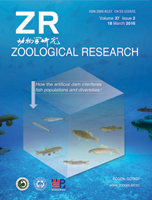
|
Zoological Research
Kunming Institute of Zoology, Chinese Academy of Sciences
ISSN: 2095-8137
Vol. 40, No. 2, 2019, pp. 139-145
|
 Bioline Code: zr19014
Bioline Code: zr19014
Full paper language: English
Document type: Report
Document available free of charge
|
|
|
Zoological Research, Vol. 40, No. 2, 2019, pp. 139-145
| en |
Interchange between grooming and infant handling in female Tibetan macaques ( Macaca thibetana  ) )
Jiang, Qi; Xia, Dong-Po; Wang, Xi; Zhang, Dao; Sun, Bing-Hua & Li, Jin-Hua
Abstract
In some non-human primates, infants function as a social tool that can bridge relationships among group members. Infants are a desired commodity for group members, and mothers control access to them. The biological market theory suggests that grooming is widespread and represents a commodity that can be exchanged for infant handling. As a limited resource, however, the extent to which infants are interchanged between mothers (females with an infant) and non-mothers (potential handlers, females without an infant) remains unclear. In this study, we collected behavioral data to investigate the relationship between grooming and infant handling in free-ranging Tibetan macaques (Macaca thibetana) at Mt. Huangshan, China. Our results showed that females with infants received more grooming than females without infants. After her infant was handled, mother females received more grooming than they did during daily grooming interactions. However, with the increasing number of infants within the social group, both the grooming that mothers received and the grooming that non-mothers invested for handling infants decreased. We also found that non-mothers invested more time in grooming to gain access to younger infants than older infants. Our results provide evidence that infants are social commodities for both mother and non-mother females. Mothers use infants for obtain grooming and non-mothers use grooming to gain access to infants. The current study implies a bidirectional and complex interchange pattern between grooming and infant handling to compensate for the dyadic grooming disparity in non-human primates.
Keywords
Tibetan macaques (Macaca thibetana); Interchange; Infant handling; Grooming; Biological market theory
|
| |
© Copyright 2019 - Zoological Research
Alternative site location: http://www.zoores.ac.cn/
|
|
